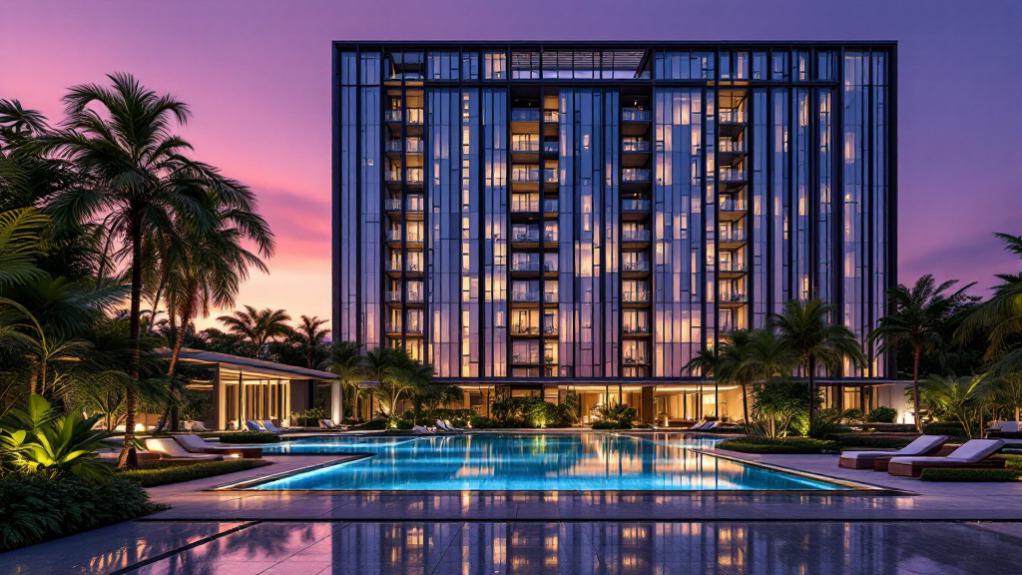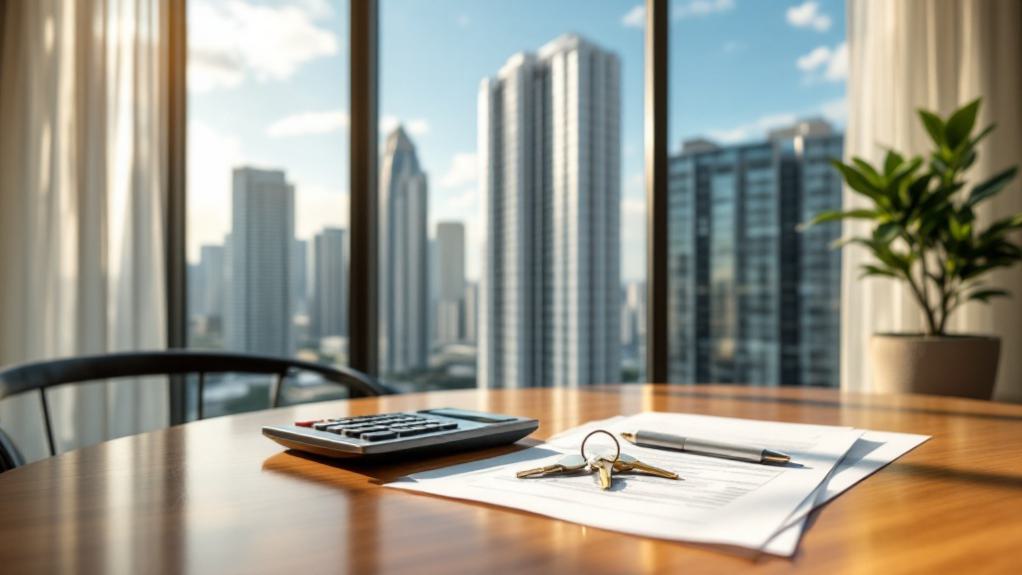Singapore’s property market encompasses diverse options including condominiums, landed properties, and HDBs, each with distinct regulatory frameworks. Foreign buyers face specific limitations, with unrestricted access to private condominiums but restrictions on landed properties and public housing. Financial considerations include Buyer’s Stamp Duty (1-5%), Additional Buyer’s Stamp Duty (up to 60%), and loans typically capped at 75% loan-to-value ratio. The transaction process involves an Option to Purchase, consideration period, and Sale and Purchase Agreement. Further exploration reveals important market trends affecting investment decisions.

While Singapore maintains one of Asia’s most prestigious real estate markets, traversing its property landscape requires thorough understanding of the regulatory framework, financial implications, and available options for different categories of buyers. The city-state offers diverse property types ranging from condominiums and apartments to landed properties, HDB flats, executive condominiums, as well as commercial and industrial properties, each operating under distinct regulatory conditions that buyers must navigate. Eligibility requirements stipulate that buyers must be at least 21 years old to purchase most properties independently.
Foreign investors face specific limitations within this stratified market, with unrestricted access to private condominiums and commercial properties, while requiring governmental approval for landed properties and being generally ineligible for public housing purchases. Executive condominiums become available to foreign buyers only after the 10-year mark from completion, reflecting Singapore’s careful balance between attracting foreign investment and prioritizing domestic housing needs. These policies are part of Singapore’s comprehensive approach to land use regulation that dictates development potential across the island.
Singapore strategically segments property market access for foreigners, balancing investment opportunities with domestic housing priorities.
The financial framework governing property acquisition includes a layered tax structure comprising Buyer’s Stamp Duty ranging from 1% to 5%, supplemented by Additional Buyer’s Stamp Duty which reaches up to 60% for foreign purchasers, creating significant fiscal considerations for international investors. Property holders must additionally account for annual property taxes calculated on progressive rates, with higher assessments applied to non-owner occupied properties.
Financing mechanisms operate within strict regulatory parameters, with loans typically capped at 75% loan-to-value ratio for first properties, requiring minimum cash down payments of 5%, and adherence to the Total Debt Servicing Ratio limitation of 55%. Loan structures generally maintain tenure periods extending to 30 years for private properties, with interest rates tied to the Singapore Interbank Offered Rate. Most buyers find it beneficial to secure pre-approved financing before beginning their property search to establish a realistic budget.
The legal transaction process follows regimented procedures beginning with an Option to Purchase accompanied by a 1% option fee, followed by a 14-21 day consideration period, and culminating in a Sale and Purchase Agreement upon exercising the option.
Recent market indicators show continued dynamism, with the private residential price index increasing 3.3% in Q4 2024, while the rental market has experienced a 4% contraction over the preceding four quarters. The government maintains market equilibrium through controlled land release programs and targeted cooling measures.
Frequently Asked Questions
Can Foreigners Own Freehold Property in Singapore?
Yes, foreigners can own freehold property in Singapore, though with significant restrictions.
While they may purchase condominiums, apartments, strata-landed houses in approved developments, commercial properties, and executive condominiums over 10 years old without special approval, landed properties remain restricted except in Sentosa Cove.
Foreign ownership in any condominium development is capped at 49%, and transactions incur an Additional Buyer’s Stamp Duty of 60% as of April 2023.
Are Property Loans Available for Non-Residents?
Non-resident foreigners can access property loans in Singapore, with major financial institutions offering loan-to-value ratios of up to 75% for first properties.
Applicants typically require valid identification, employment passes or work visas, thorough income documentation, and proof of good credit standing.
Interest rates for non-residents are generally higher than for citizens, and additional considerations include currency exchange risks for foreign currency denominated loans and regular property valuations required by lenders.
What Are Typical Additional Costs Beyond Purchase Price?
Beyond the purchase price, property buyers in Singapore must budget for substantial transaction costs, including stamp duties (BSD of 1-4%, ABSD up to 60% for foreigners), legal fees ($2,500-$3,000), loan-related expenses (1.5-3% interest rates), and recurring ownership costs.
These additional expenses typically include property tax (4-16% of annual value), maintenance fees ($200-$1,000 monthly for condominiums), conservancy charges for HDB flats, and various insurance premiums for mortgage and property protection.
How Long Does the Property Purchase Process Take?
The property purchase timeline in Singapore varies considerably by property type.
New launch condominiums typically require 8+ weeks from AIP to down payment completion, while resale condos generally conclude within 8-12 weeks.
HDB resale transactions follow a structured 13-14 week timeline with mandatory processing periods.
Key variables affecting duration include financing readiness, seller cooperation, regulatory approvals, and administrative processing requirements established by relevant authorities.
What Are the Annual Property Tax Rates?
Singapore’s property tax rates vary by usage category.
Owner-occupied residential properties follow a progressive structure ranging from 0% to 32%, with the first $12,000 of Annual Value untaxed.
Non-owner-occupied residential properties incur higher rates between 12% and 36%.
Commercial and industrial properties are subject to a flat 10% tax rate on Annual Value, regardless of property size or utilization.
Taxes are calculated by applying the relevant rate to the property’s estimated annual rental value.





